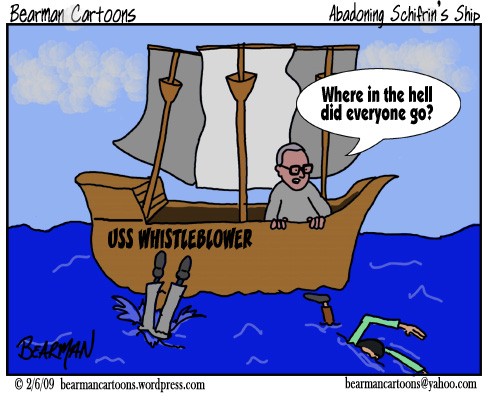Protect the whistleblowers…. they are precious
 A whistleblower is a person who exposes misbehavior, a wrongdoing, alleged dishonesty or illegal activity occurring in an organization/society. The alleged misconduct may be classified in many ways; for example, a violation of a law, rule, regulation and/or a direct threat to public interest, such as fraud, health and safety violations, sexual molestation and corruption. Whistleblowers may make their allegations internally; for example, to other people within the accused organization or externally to regulators, law enforcement agencies, to the media or to groups concerned with the issues. Whistleblowers play a vital role in exposing corruption, fraud, and mismanagement, and in preventing disasters that arise from negligence or wrongdoing. Those within public institutions and the private sector who speak out about wrongdoing potentially save lives and resources. It is in the public interest that the law protects whistleblowers so that they can speak out if they find mismanagement in an organization. Blowing the whistle is more formally known as ‘making a disclosure in the public interest.’ Whistleblowers risk their job, sometimes their life, and their prestige for social welfare. It is therefore the society’s obligation to protect them from getting victimized.
A whistleblower is a person who exposes misbehavior, a wrongdoing, alleged dishonesty or illegal activity occurring in an organization/society. The alleged misconduct may be classified in many ways; for example, a violation of a law, rule, regulation and/or a direct threat to public interest, such as fraud, health and safety violations, sexual molestation and corruption. Whistleblowers may make their allegations internally; for example, to other people within the accused organization or externally to regulators, law enforcement agencies, to the media or to groups concerned with the issues. Whistleblowers play a vital role in exposing corruption, fraud, and mismanagement, and in preventing disasters that arise from negligence or wrongdoing. Those within public institutions and the private sector who speak out about wrongdoing potentially save lives and resources. It is in the public interest that the law protects whistleblowers so that they can speak out if they find mismanagement in an organization. Blowing the whistle is more formally known as ‘making a disclosure in the public interest.’ Whistleblowers risk their job, sometimes their life, and their prestige for social welfare. It is therefore the society’s obligation to protect them from getting victimized.
The term whistle-blower comes from the whistle – a referee uses to indicate an illegal or foul play. US civic activist Ralph Nader coined the phrase in the early 1970s.
They are a crucial source of intelligence to help society, organizations and governments in identifying wrongdoings and hazards in society. However, often whistleblowers have been disgracefully treated for doing good. They are victimized and oppressed for their good work. We have heard of too many cases of inexcusable treatment given to whistleblowers by others in society – their colleagues, head of departments, statutory bodies, police, and government. In 2005, in India, Shanmughan Manjunath, a former manager at Indian Oil Corporation Ltd (IOCL), spoke against adulteration of petrol. He was shot dead on November 19, 2005, allegedly by a petrol pump owner from Uttar Pradesh. This lack of action has a profound impact on confidence and trust in the system, and means that employees are less likely to blow the whistle for fear of what may happen to them. An engineer, Satyendra Dubey, was murdered in November 2003; Dubey had blown the whistle against appalling frauds taking place in the Golden Quadrilateral project by the National Highway Authority of India. Take the recent case of D.K.Ravi an additional commissioner of commercial taxes (enforcement) a 2009-batch Indian Administrative Service officer, whose death was camouflaged as suicide; Ravi fought against the land mafia in Karnataka for which he had to die unnaturally at a very young age.
 The corporate world is also the same. Under the lable of organization “ethos” and “loyalty” lot of ill-doing has to be borne by employees and many things are hushed up in organizations. Prior to the 1960s, corporations had broad self-sufficiency in employee policies and could fire an employee at will, even for no reason. Employees were expected to be “loyal” to their organizations at any cost. Then labour unions were formed, and unions made noise for anything and everything. But, then you also get to see organizations like IBM who allow open-door policy which allowed employees to discuss their issues and grievances if any.
The corporate world is also the same. Under the lable of organization “ethos” and “loyalty” lot of ill-doing has to be borne by employees and many things are hushed up in organizations. Prior to the 1960s, corporations had broad self-sufficiency in employee policies and could fire an employee at will, even for no reason. Employees were expected to be “loyal” to their organizations at any cost. Then labour unions were formed, and unions made noise for anything and everything. But, then you also get to see organizations like IBM who allow open-door policy which allowed employees to discuss their issues and grievances if any.
In a survey of Ministry of Defense employees, only 40% of respondents felt they would not suffer retaliation if they raised a concern, and a survey of Department of Health employees found only 54% of respondents felt confident that they could speak up. Over one third of civil service employees do not even know how to raise a concern under the civil service code. Take the case of Durga Shakti Nagpal IAS of 1984 cadre who was suspended for launching a massive drive against corruption and illegal sand mining within her jurisdiction of Gautam Budh Nagar and later for allegedly demolishing an illegal mosque wall in a village in Greater Noida. Of course in her case, the opposition political parties, associations of Indian bureaucrats and the general public on online social media demanded for her suspension to be revoked and it was done!
 Whistleblower’s problems are often concealed rather than solved. Globally, there have been multiple instances of threatening, harassment and even murder of various whistleblowers. The India Law Ministry is working on a draft to amend the Whistleblowers Protection Act 2011 aimed at safeguarding against disclosures affecting sovereignty and integrity of India, security of the state, etc. Whistleblower’s protection should be broadly defined without any loopholes in it.
Whistleblower’s problems are often concealed rather than solved. Globally, there have been multiple instances of threatening, harassment and even murder of various whistleblowers. The India Law Ministry is working on a draft to amend the Whistleblowers Protection Act 2011 aimed at safeguarding against disclosures affecting sovereignty and integrity of India, security of the state, etc. Whistleblower’s protection should be broadly defined without any loopholes in it.
Culturally whistleblowing implies betrayal. There is still a gap between the promoting and protecting whistleblowers. In most of organizations employees are scared to speak up for fear of personal punishment or losing job. Many times employees confide some wrongdoing in a wrong or faulty person; he/she misguide the whistleblower by carrying tales to the higher-ups. Most times employees feel that no one is listening; they are unlikely to report any malpractice or misconduct that they see. Speaking out is difficult, especially in a culture where brazenness is practiced openly.
Whistleblowing is most effective when it operates in an open-door culture that actively encourages employees to report concerns. It works in societies/governments/organizations which work for bringing in a positive change. Not only does this create an environment where problems are dealt with before they become potentially damaging risks. The mentality of the top level is vital. Quality communication in handling the matter is essential.
A new report which was co-authored by researchers from Australian NGO Blueprint for Free Speech, Transparency International Australia, Griffith University and Melbourne University, on the state of affairs of whistleblower protection based on a research in some of the world’s richest countries has found that Germany ranks alongside Argentina, Brazil, India, Indonesia, Italy, Mexico, Russia, Saudi Arabia and Turkey where whistlebloweres are not protected. These countries do the least to ensure that whistleblowers can speak out without fear of revenge. The report found that serious shortcomings remained in most of the above mentioned countries – and those shortcomings affected most of the areas potential whistleblowers would be concerned about. Provisions for whistleblowers to remain anonymous when using internal channels to express their concerns were identified as a particular weakness. Most of the EU states are poor in protecting whistleblowers.
There is limited research about the psychological impact of whistle blowing. However, poor experiences of whistleblowing can cause discouragement to people who want to voice disorders. Whistleblowers often become paranoid, anxious and suffer from nightmare. Depression is often reported by whistleblowers, and suicidal thoughts may occur in up to about 10%. Their health conditions often decline as they become fearful. In short, whistleblowers suffer for speaking. Nobody in power likes whistleblowers.
Precise, clear, inclusive, simple, and effective legislation must be introduced to protect those who, in good faith and on rational grounds, speak out against suspected acts of wrongdoing. It is everybody’s responsibility to provided safe and peaceful atmosphere for whistleblowers. As a society we can no longer afford to ignore their wellbeing. There should not be gaps between writing policy, adopting it, and then going on with business as usual. Let’s stop the duplicity somewhere.












































